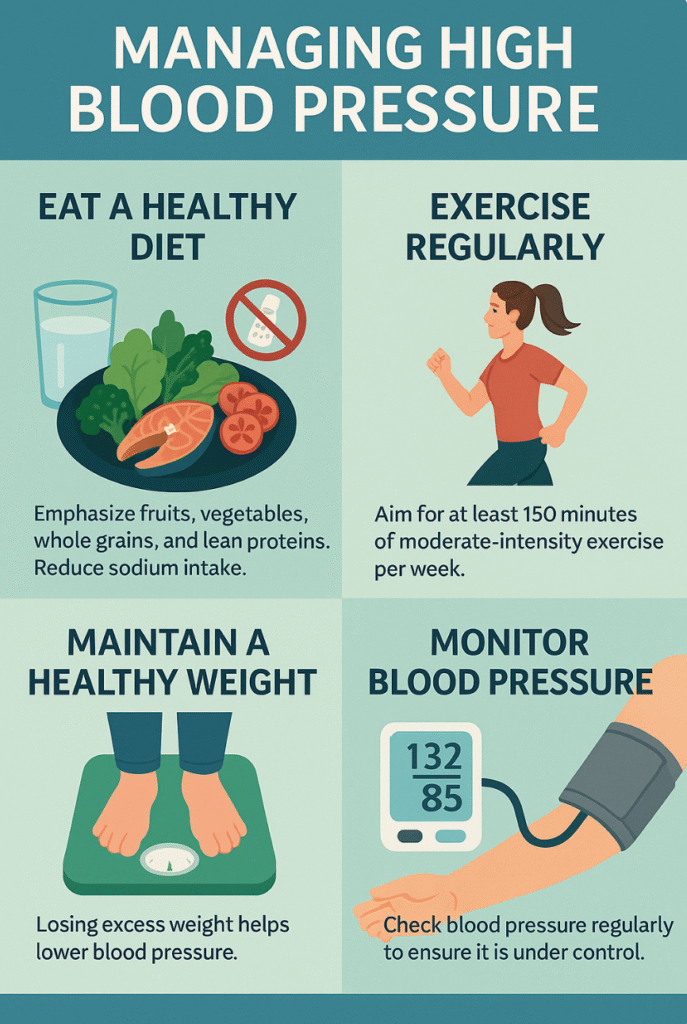High blood pressure (hypertension) is often called the “silent killer” because it rarely shows symptoms but significantly increases the risk of heart attack, stroke, and kidney disease. According to the World Health Organization (WHO), over 1.3 billion people worldwide live with hypertension — and nearly half are unaware of it. Fortunately, lifestyle changes and consistent monitoring can effectively manage or even prevent this condition.
💓 What Is High Blood Pressure?
Blood pressure measures the force of blood pushing against artery walls. It’s expressed as systolic/diastolic (e.g., 120/80 mmHg).
- Systolic: Pressure when the heart beats
- Diastolic: Pressure when the heart rests
A reading consistently above 130/80 mmHg is considered high blood pressure. Left unmanaged, it damages arteries, strains the heart, and accelerates organ deterioration.
🧠 Causes and Risk Factors
- Genetics: Family history plays a major role.
- Lifestyle: Poor diet, sedentary habits, and chronic stress contribute significantly.
- Medical Conditions: Diabetes, kidney disease, and sleep apnea can increase risk.
- Age and Gender: Risk rises after age 40, especially for men, though women’s risk increases post-menopause.
🥗 1. Eat a Heart-Healthy Diet
A diet rich in fruits, vegetables, whole grains, and lean proteins is the cornerstone of blood pressure control.
- Reduce Sodium: Limit intake to less than 2,300 mg per day (1 teaspoon of salt).
- Increase Potassium: Found in bananas, spinach, and sweet potatoes — helps counteract sodium effects.
- Adopt the DASH Diet: The Dietary Approaches to Stop Hypertension plan is scientifically proven to lower blood pressure naturally.
🔗 Learn more: American Heart Association – DASH Diet
🏃♀️ 2. Exercise Regularly
Physical activity strengthens the heart, allowing it to pump blood more efficiently.
- Aim for 150 minutes per week of moderate-intensity activity (e.g., brisk walking, swimming, or cycling).
- Include strength training twice per week.
- Even short sessions of 10–15 minutes throughout the day make a measurable difference.
⚖️ 3. Maintain a Healthy Weight
Excess weight increases strain on the cardiovascular system. Studies show that losing just 5–10% of body weight can lower blood pressure significantly.
💡 Tip: Combine regular exercise with mindful eating — smaller portions, slower meals, and avoiding late-night snacks.
🩺 4. Monitor Your Blood Pressure
Home blood pressure monitors help track your progress.
- Measure twice daily — once in the morning and once in the evening.
- Keep a log to share with your healthcare provider.
- Target range: Below 120/80 mmHg for optimal cardiovascular protection.
🚭 5. Avoid Smoking and Limit Alcohol
Nicotine constricts arteries and raises blood pressure instantly. Quitting smoking improves heart health within weeks.
Alcohol should be limited to:
- 1 drink/day for women
- 2 drinks/day for men
🧘♂️ 6. Manage Stress
Chronic stress triggers adrenaline and cortisol release, raising blood pressure.
Effective strategies include:
- Meditation or mindfulness
- Deep-breathing exercises
- Spending time in nature
- Prioritizing sleep (7–9 hours per night)
💧 7. Stay Hydrated and Reduce Caffeine
Dehydration thickens blood and increases pressure. Drink enough water daily, and limit caffeine — excessive intake can temporarily spike blood pressure.
🩹 8. When to Seek Medical Help
If your blood pressure remains above 140/90 mmHg despite lifestyle changes, consult a healthcare professional. Early intervention prevents serious complications like heart failure, stroke, and kidney damage.
🌿 Key Takeaway
Managing blood pressure is not about temporary fixes — it’s about sustainable habits. With the right diet, regular movement, and mindful living, most people can maintain healthy levels naturally, extending both lifespan and quality of life.
🇰🇷 Premium Korean Ginseng Online Shop







